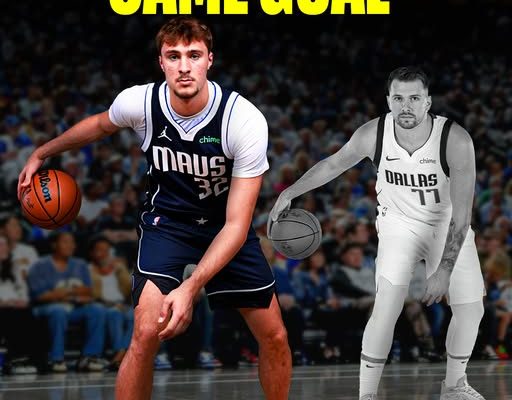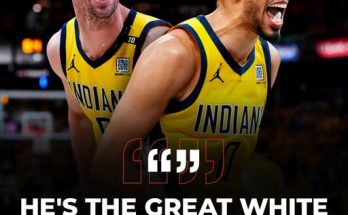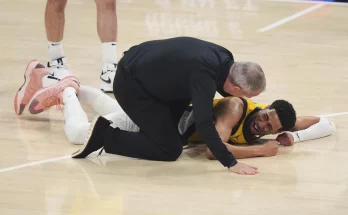The Luka era in Dallas might be drawing to a close, but the Mavericks aren’t mourning—they’re preparing. As whispers of Luka Dončić’s eventual departure grow louder, a new name is already lighting up the skyline in Texas: Cooper Flagg. And make no mistake—he’s not here to fill Luka’s shoes. He’s here to step into his own spotlight, carving out a different identity, a new direction, and possibly a new dynasty for the Dallas Mavericks.
This isn’t your typical succession plan. For most franchises, when a generational superstar like Luka Dončić either hints at unrest or shows signs of departure, panic sets in. General managers scramble. Fans despair. The front office throws contracts and desperation at Band-Aid fixes. But the Mavericks have chosen a different route. Rather than clinging to the last embers of the Luka era, they’ve positioned themselves ahead of the curve by drafting Cooper Flagg—a basketball prodigy with vision, length, and a level of competitiveness rarely seen in teenagers.
What makes this moment so monumental isn’t just that Flagg is arriving. It’s that Dallas is welcoming him with open arms, not as a replacement for Luka, but as a recalibration of everything they are and want to be. There’s an understanding in the organization that Flagg doesn’t need to be Luka. He needs to be the first Cooper Flagg. And so far, all signs point to the Mavericks being ready to support that transformation.
Flagg brings a different energy—something fresh and futuristic. While Luka dazzled with his wizardry, craftiness, and scoring IQ, Flagg’s game is built on versatility and tenacity. He’s the kind of player who can affect the game on both ends—blocking shots, switching onto smaller guards, hitting spot-up threes, and attacking closeouts with ferocity. He may not command the ball like Luka does, but that’s exactly the point. The Mavericks aren’t re-running an old script; they’re flipping to a new chapter.
In Summer League play, Flagg’s presence was already being felt. While his stat lines didn’t scream superstardom yet, the subtleties in his game did—his rotations, his unselfishness, his decision-making in traffic. Dallas saw enough in those early flashes to begin recalibrating the team’s identity around him. The offense isn’t going to be heliocentric anymore. It’s going to be fluid, defense-first, and driven by high-IQ movement both on and off the ball.
The truth is, teams that cling to a fading superstar identity often spiral. Look no further than the post-Kobe Lakers or the post-Wade Heat. But Dallas is refusing to go down that path. Instead, they’re building something nimble, durable, and modern. Cooper Flagg fits perfectly into this new vision. At 6’9” with a seven-foot wingspan and innate instincts, he’s the prototype for the two-way forward that every NBA team now covets. He’s got shades of Kawhi’s defense, glimpses of Tatum’s shot mechanics, and an energy all his own. And crucially, he doesn’t need the ball for 40 minutes a night to dominate a game.
Of course, this doesn’t mean that Luka is definitively gone. He’s still under contract, and his brilliance is undeniable. But the relationship between Luka and the Mavericks feels like one that’s matured into its final act. Luka has done everything short of bringing a championship to Dallas—multiple All-NBA appearances, deep playoff runs, unforgettable performances. But with the league evolving around pace, space, and defensive flexibility, it’s become increasingly clear that building a championship roster around a singular high-usage star is far more difficult than it used to be.
What Dallas is aiming for with Flagg is something more balanced, more sustainable. Instead of bending the roster to fit around one player’s needs, they want a team that adapts to matchups, that shares the load, that defends together and scores together. Flagg can be the face of that movement, but he won’t be the only piece. The Mavericks are making complementary moves: bringing in low-ego veterans, spacing bigs, and perimeter defenders who can unlock Flagg’s full versatility. There’s a reason why they’ve emphasized guys like Dean Wade and Maxi Kleber—role players who don’t need touches to matter.
More than that, Dallas is focused on building a culture—a long-term ethos that survives beyond individual stars. Flagg, with his Maine work ethic and quiet determination, is the ideal poster child for that kind of mindset. He’s already earning praise from coaches for his professionalism, his openness to feedback, and his commitment to winning over personal stats. These are the intangible elements that make dynasties, not just playoff teams.
And yet, it’s still fair to acknowledge that comparisons will come. Luka and Flagg will share a jersey in transition. If Luka stays for one more season or two, the Mavericks will be in a unique spot—housing the past and the future on the same roster. That transitional tension could be either volatile or transformative. For Flagg, having a chance to learn from Luka—how he reads defenses, how he manipulates pace, how he rises in the biggest moments—could accelerate his development. For Luka, mentoring a successor might allow him to recalibrate his leadership style or even reignite his joy for the game.
But even if Luka leaves sooner rather than later, the Mavericks are ready. That’s the remarkable thing about Flagg’s arrival. It doesn’t feel like a consolation prize. It feels like a rebirth. The city of Dallas is known for its ability to reinvent itself—from its skyline to its sports teams. And now, with Flagg, it’s poised to do it again on the basketball court.
Flagg also comes into the league with a rare blend of humility and hype. He’s aware of the expectations, but he doesn’t seem to be burdened by them. There’s a calmness in his interviews, a steady confidence in his game. While Luka’s rise was meteoric and often marked by spectacle, Flagg’s ascension feels more methodical, more controlled. That’s not a knock—it’s a complement. Different paths, different leaders, different chapters.
Already, fans are lining up to get Flagg jerseys. He’s the kind of player that a fanbase can grow with—watching him go from promising rookie to All-Star to franchise cornerstone. And for the Mavericks, that long arc of potential is exactly what they need right now. In Flagg, they see not just a player, but a philosophy. Not just a skillset, but a new standard.
It’s also worth noting that the NBA is shifting toward valuing wings and forwards who can defend multiple positions and make reads on the fly. Gone are the days of building around isolation-heavy guards unless they’re surrounded by elite defenders. Flagg fits this new archetype perfectly. He’s the kind of piece that you can build upward from—a foundation, not just a feature.
As Dallas navigates the next year—balancing Luka’s future, developing Flagg, making roster decisions—the most important thing they’ve established is clarity. They know who they are becoming. That clarity is rare in professional sports, where teams often react rather than plan. But the Mavericks have planned. And Cooper Flagg is at the center of that blueprint.
There will be growing pains. Flagg will have off nights. There will be moments where the Luka comparisons feel unfairly suffocating. But in the long run, Dallas isn’t betting on flash—they’re betting on fit, mindset, and development. That’s a bet that tends to pay off in the modern NBA.
For all the excitement, though, perhaps the biggest victory for Dallas is this: they’re giving fans hope again. Not just hope that they’ll win games, but hope that they’re building something lasting. Cooper Flagg isn’t just a new face—he’s a new identity, one rooted in adaptability, intensity, and vision.
So no, Flagg isn’t replacing Luka. He’s doing something far more important. He’s taking the Mavericks in a new direction—one that may eventually lead to heights even Luka couldn’t reach. In doing so, he’s reminding Dallas that every end is also a beginning. And this beginning? It’s looking special already.



